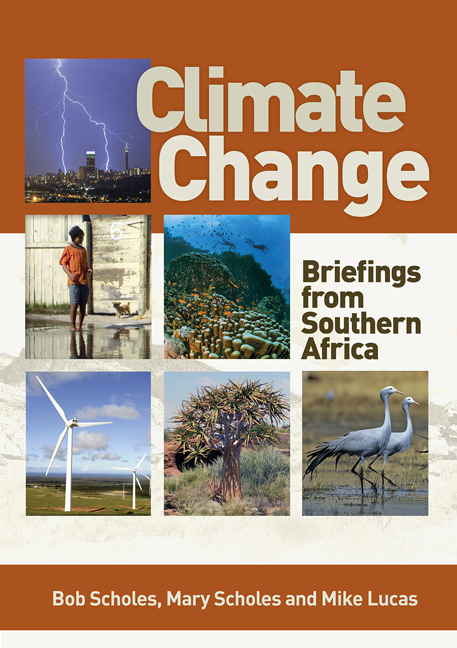Book contents
- Frontmatter
- Acknowledgements
- Contents
- Foreword
- Acronyms and abbreviations
- Preface
- How do governments assess climate change?
- Section 1 Earth system science: The processes that underlie climate change
- Section 2 Consequences of a changing climate for the Southern African environment
- Section 3 Consequences of a changing climate for society
- Section 4 What we can do to avoid and adapt to climate change
- Codicil Is there a dangerous level of climate change?
- Glossary
- List of figures
- References
- Reading list
- Index
Preface
Published online by Cambridge University Press: 20 April 2018
- Frontmatter
- Acknowledgements
- Contents
- Foreword
- Acronyms and abbreviations
- Preface
- How do governments assess climate change?
- Section 1 Earth system science: The processes that underlie climate change
- Section 2 Consequences of a changing climate for the Southern African environment
- Section 3 Consequences of a changing climate for society
- Section 4 What we can do to avoid and adapt to climate change
- Codicil Is there a dangerous level of climate change?
- Glossary
- List of figures
- References
- Reading list
- Index
Summary
Limiting the impacts of human activities on the global environment is one of the defining challenges of the twenty-first century. The remarkable fact that the cumulative actions of several billion people over the past two centuries have changed Earth processes substantially is an indication of the degree to which our species has come to dominate the planet.
The way in which we have transformed the land surface is obvious, but we have also altered the composition of the atmosphere, raised the temperature of the air and ocean, caused rainfall to increase in some places and decrease in others, and caused ice bodies to melt andsea levels to rise. The changes we observe have a direct connection to human well-being. The sheer number of people alive today is partly responsible for the size of our footprint on the planet, but the dominant cause is the dramatic increase in modern times in the per person consumption of resources and production of waste. The lifestyles to which many people in the developed world have become accustomed, and to which the less fortunate legitimately aspire, come at a large cost to the environment. Most of that debt will be borne by future generations: our comfort and luxury create future disadvantage. This raises profound ethical issues as well as practical difficulties in persuading present generations that the problem is real and urgent. The combined inertia of the global climate system, the political systems which govern our actions, and the technology systems that satisfy our demands for energy and mobility mean that, by the time everyone feels the heat, we are likely to have overshot the climate ‘comfort zone’ in which modern civilization evolved. This will place the welfare of humans and the millions of other species with which we share the planet in jeopardy.
The purpose of this book is to explain the scientific understanding of climate change as simply as possible, but without glossing over the complexity of how the world works. Other books with similar objectives exist, but none focuses specifically on Southern Africa. Our intended audience is educated citizens: people in a variety of professions, university students, high-school learners, and people who have an interest in the world and keeping it in a liveable condition for their children and grandchildren.
- Type
- Chapter
- Information
- Climate ChangeBriefings from Southern Africa, pp. xiPublisher: Wits University PressPrint publication year: 2015

